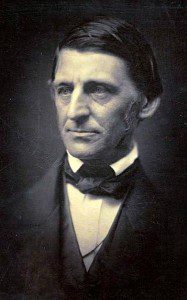 I’m a big fan of Ralph Waldo Emerson. That’s why I’m happy to share an article today by Daniel Berkowitz about him. In addition to freelancing for websites and magazines, Daniel is a student at Columbia University’s Graduate School of Journalism. Before enrolling, he played baseball and majored in Religious Studies at Vassar College. His senior thesis transposed Emerson’s conception of individual democratic contribution into the modern world of standup comedy. Below he shares his thoughts about Emerson in a ways that’s very enlightening.
I’m a big fan of Ralph Waldo Emerson. That’s why I’m happy to share an article today by Daniel Berkowitz about him. In addition to freelancing for websites and magazines, Daniel is a student at Columbia University’s Graduate School of Journalism. Before enrolling, he played baseball and majored in Religious Studies at Vassar College. His senior thesis transposed Emerson’s conception of individual democratic contribution into the modern world of standup comedy. Below he shares his thoughts about Emerson in a ways that’s very enlightening.
Emerson and the Self
by Daniel Berkowitz
I think what I love most about Ralph Waldo Emerson is that, despite the fact that he was religious, his teachings can used by both religious believers as well as those who do not publicly endorse any specific creed, without losing any of their wisdom or value.
I wrote my undergraduate thesis on how Emerson’s teachings, though certainly idealistic, can lead, on a grand scale, to a better, more effective American democracy. What I aim to show here, however, is how self-reliance, the basis of Emerson’s philosophy, is critical to individual happiness.
Emerson posited that every person has, what he called, a “genius.” For my purposes, the genius is better construed as a unique voice, a personality, a perspective, etc. In this way, every person is different from all others (if ever so slightly). By extension, every person looks at the world differently, and listens to and interprets external ideas in different ways. Hence every person is self-reliant in his own way.
Self-reliance, in Emerson’s view, is the aversion of blind conformity; it is the universal obligation of the individual to act, live and give back to society according to his genius—his unique voice.
If one listens to his genius, he is self-reliant. If one thinks for himself, he is self-reliant. If one trusts himself, believes in himself and knows he has unlimited potential, he is self-reliant. The key to happiness lies in honoring the self.
Look at any successful artist or person of note. Do you think Michelangelo painted the Sistine Chapel by burying his genius? Do you think Bob Dylan composed some of our greatest songs simply by copying those before him? And do you think Mark Zuckerberg created a social network empire by ignoring what his gut—his genius—told him? No, no and no. All successful individuals, irrespective of their field, find success and contentment by honoring their individuality.
Self-reliance does not dictate that one must ignore the ideas of others; it instead compels the individual to meditate on them—to see if they jive with his sensibility. If they do not, then those ideas are for not for him. What self-reliance teaches us is that we, as individuals, all of us, are important. We all have a voice. We all have something we want to say. In all of us lay the seeds of something beautiful. We just need to tap into our geniuses. We just need to be self-reliant.
This is where it gets tricky. For how does one find his genius? For some, it can be difficult. For others, it’s simple. There is no one right way to find your genius. What you must accept, though, is that no matter what you have been told, no matter how you feel, no matter what your circumstances may lead you to believe, you do have importance. You do have value. You do have a genius.
It’s there. It’s deep inside you. It’s at the core of your being. It binds your world together. And it’s always with you.
Your genius is the lens through which you view the universe. It’s the voice in your head that tells you whether or not you agree. It’s what makes you, you. It’s who you are. It’s the only thing in this entire world that solely belongs to you. And no matter how much someone else may want it, it’s yours. All you have to do is believe in it.
Once it’s found, it will only better your life. The trick to finding it lies in three simple words: Think for yourself. No, do not ignore others, and no, do not subjugate them, either. Simply allow for your voice to enjoy the value it inherently deserves.
Emerson famously wrote, “Imitation is suicide.” What he meant was that if we blindly follow, we negate our own worth. We minimize our capacity for excellence and we do not live honorably. If, however, we follow our geniuses, if we honor our inalienable worth, if we truly realize that we, as individuals, are important, valued and capable of immense beauty and excellence—if we do these things, we are self-reliant. And if we are self-reliant, no one can command us. For if we believe in ourselves—if we trust our geniuses—the world is at our fingertips.
I’d like to close this post with my favorite Emerson quote. It uses some religious language, but I do not believe that diminishes its appeal. I hope this post has, in some way, helped you reorient yourself with your world. For it’s yours, and you only get one. On that note, please enjoy Emerson:
“To believe your own thought, to believe that what is true for you in your private heart is true for all men,—that is genius. Speak your latent conviction, and it shall be the universal sense; for the inmost in due time becomes the outmost, and our first thought is rendered back to us by the trumpets of the Last Judgment.”
***************
Take the 31 Days of Self-Love Challenge and get my book, How Do I Love Me? Let Me Count the Ways for free at http://howdoiloveme.com. And you can post your loving acts HERE to reinforce your intention to love yourself. Read my 31 Days of Self-Love Posts HERE.
Please leave comments under my posts so we can stay connected.

